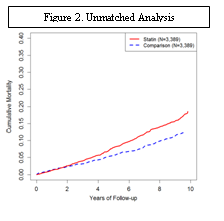Session Information
Session Type: ACR Plenary Session
Session Time: 11:00AM-12:30PM
Background/Purpose: Recent studies have shown an increase in cardiovascular and all-cause mortality in ankylosing spondylitis (AS) and psoriatic arthritis (PsA).1 The hypothesized dual role of statins in both lowering lipids and reducing inflammation may thus lead to survival benefits in patients with these seronegative spondyloarthropathies. We examined the potential survival benefit of statin use in AS and PsA within a general population context.
Methods: We performed an incident user cohort study with time-stratified propensity score matching using a UK general population database. The population studied included patients with AS or PsA between January 1, 2000 and December 31, 2014. To account for potential confounders, we compared propensity score-matched cohorts of statin initiators and comparators (non-initiators) within 1-year cohort accrual blocks. 50 variables were used to create propensity scores, including but not limited to the disease duration, socio-economic status, BMI, lifestyle factors, and medication use.
Results: 2,904 patients with AS or PsA who initiated statins compared to 2,904 propensity matched-comparators with AS or PsA that were not started on statins. 271 died during the follow up (mean = 5.3 years), whereas among the propensity-matched non-initiators, 376 patients died during the follow up (mean = 5.15 years) (Figure 1). This corresponds to incidence rates of 17.62/1000 and 25.14/1000 person-years (PY), respectively. The baseline characteristics were well balanced in the two groups. Statin initiation was associated with a 33% reduction of all-cause mortality (HR=0.68, 95% CI 0.57-0.81). When we compared the unmatched cohorts to determine the effectiveness of our propensity score matching, the statin initiators (n=3,389) actually showed a 44% higher risk of mortality (HR=1.44, 95% CI 1.22-1.70) than non-initiators (n=3,389 randomly selected) due to confounding by indication (Figure 2).
Conclusion: This general population-based cohort study indicates that statin initiation is associated with a 33% lower risk of mortality for patients with AS or PsA. The magnitude of the inverse association appears to be larger than that observed in population-based cohort studies of patients with rheumatoid arthritis (21%)2 and in meta analyses of randomized trials of the general population (9-14%)3, potentially due to the dual benefits of statin use (i.e. lipid lowering and anti-inflammatory effects) in patients with seronegative spondyloarthropathies. References: 1. Haroon et al. Ann Int Med 2015. 2. Schoenfeld et al. Ann Rheum Dis 2015. 3. Mihaylova et al. Lancet 2012.
To cite this abstract in AMA style:
Oza A, Lu N, Choi HK. Survival Benefit of Statin Use in Ankylosing Spondylitis and Psoriatic Arthritis: A General Population-Based Cohort Study [abstract]. Arthritis Rheumatol. 2016; 68 (suppl 10). https://acrabstracts.org/abstract/survival-benefit-of-statin-use-in-ankylosing-spondylitis-and-psoriatic-arthritis-a-general-population-based-cohort-study/. Accessed .« Back to 2016 ACR/ARHP Annual Meeting
ACR Meeting Abstracts - https://acrabstracts.org/abstract/survival-benefit-of-statin-use-in-ankylosing-spondylitis-and-psoriatic-arthritis-a-general-population-based-cohort-study/


